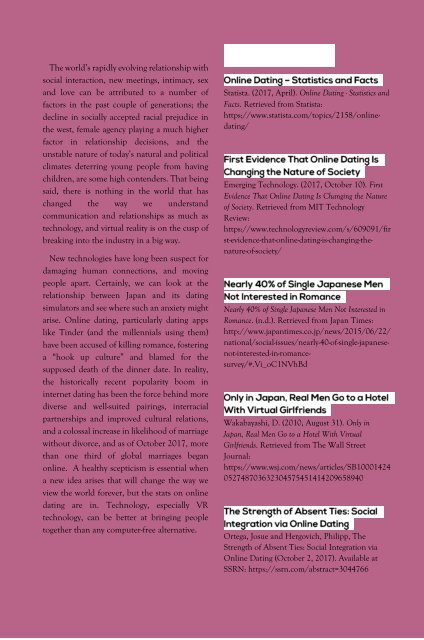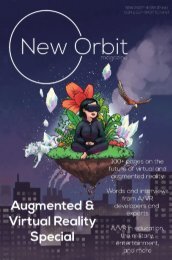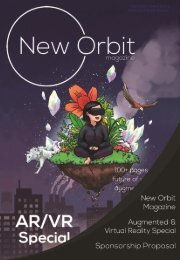Feb 2018 v01 online
((Incomplete formatting))
((Incomplete formatting))
Create successful ePaper yourself
Turn your PDF publications into a flip-book with our unique Google optimized e-Paper software.
The world’s rapidly evolving relationship with<br />
social interaction, new meetings, intimacy, sex<br />
and love can be attributed to a number of<br />
factors in the past couple of generations; the<br />
decline in socially accepted racial prejudice in<br />
the west, female agency playing a much higher<br />
factor in relationship decisions, and the<br />
unstable nature of today’s natural and political<br />
climates deterring young people from having<br />
children, are some high contenders. That being<br />
said, there is nothing in the world that has<br />
changed the way we understand<br />
communication and relationships as much as<br />
technology, and virtual reality is on the cusp of<br />
breaking into the industry in a big way.<br />
New technologies have long been suspect for<br />
damaging human connections, and moving<br />
people apart. Certainly, we can look at the<br />
relationship between Japan and its dating<br />
simulators and see where such an anxiety might<br />
arise. Online dating, particularly dating apps<br />
like Tinder (and the millennials using them)<br />
have been accused of killing romance, fostering<br />
a “hook up culture” and blamed for the<br />
supposed death of the dinner date. In reality,<br />
the historically recent popularity boom in<br />
internet dating has been the force behind more<br />
diverse and well-suited pairings, interracial<br />
partnerships and improved cultural relations,<br />
and a colossal increase in likelihood of marriage<br />
without divorce, and as of October 2017, more<br />
than one third of global marriages began<br />
<strong>online</strong>. A healthy scepticism is essential when<br />
a new idea arises that will change the way we<br />
view the world forever, but the stats on <strong>online</strong><br />
dating are in. Technology, especially VR<br />
technology, can be better at bringing people<br />
together than any computer-free alternative.<br />
Statista. (2017, April). Online Dating - Statistics and<br />
Facts. Retrieved from Statista:<br />
https://www.statista.com/topics/2158/<strong>online</strong>dating/<br />
Emerging Technology. (2017, October 10). First<br />
Evidence That Online Dating Is Changing the Nature<br />
of Society. Retrieved from MIT Technology<br />
Review:<br />
https://www.technologyreview.com/s/609091/fir<br />
st-evidence-that-<strong>online</strong>-dating-is-changing-thenature-of-society/<br />
Nearly 40% of Single Japanese Men Not Interested in<br />
Romance. (n.d.). Retrieved from Japan Times:<br />
http://www.japantimes.co.jp/news/2015/06/22/<br />
national/social-issues/nearly-40-of-single-japanesenot-interested-in-romancesurvey/#.Vi_oC1NVhBd<br />
Wakabayashi, D. (2010, August 31). Only in<br />
Japan, Real Men Go to a Hotel With Virtual<br />
Girlfriends. Retrieved from The Wall Street<br />
Journal:<br />
https://www.wsj.com/news/articles/SB10001424<br />
052748703632304575451414209658940<br />
Ortega, Josue and Hergovich, Philipp, The<br />
Strength of Absent Ties: Social Integration via<br />
Online Dating (October 2, 2017). Available at<br />
SSRN: https://ssrn.com/abstract=3044766










